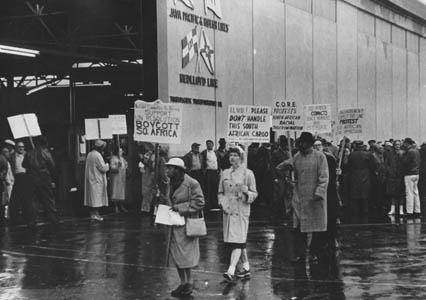The International Longshore and Warehouse Unionís (ILWU) long fight against racism and apartheid was highlighted when San Franciscoís Local 10 came out to honor the passing of Nelson Mandela in December.

In 1962, anti-apartheid activists held a community picket at Pier 19 in San Francisco protesting the Dutch ship Raki, which was carrying hemp, coffee and asbestos from South Africa. Photo courtesy of ILWU Library and Archives
By Patrick Burnson
Published: February, 2014
The International Longshore and Warehouse Union’s (ILWU) long fight against racism and apartheid was highlighted when San Francisco’s Local 10 came out to honor the passing of Nelson Mandela in December.
When Local 10 president-elect Melvin Mackay attended Mandela’s funeral in South Africa on behalf of the ILWU, he quite rightly observed that this was a “once in a lifetime” event. “Mandela became a world-wide symbol for human rights and the struggle for social justice,” said Mackay. “He helped South Africa along the path to democracy. The world is a better place because of him. He will be missed.”
ILWU editor and archivist Roy San Filippo wrote a stirring tribute to Mandela, noting that ILWU Local 10 members helped put the anti-apartheid struggle in the national spotlight in 1984 when they refused to unload South African cargo from the Dutch ship Nedlloyd Kimberly at San Francisco’s Pier 80.
“Although they unloaded the rest of the ship, the South African ‘bloody’ cargo of steel, auto parts and wine remained in the ship’s hold for 10 days while community supporters held daily demonstrations outside protesting South Africa’s apartheid regime,” San Filippo wrote.
San Fillippo added that at its peak, the demonstration reached an estimated 700 people. Employers tried to find another West Coast port to take the ship, but because of solidarity from other ILWU locals, no port was willing to accept the Nedlloyd Kimberly. Local 34 clerks played a crucial role in the action by identifying the South African cargo. The cargo was finally unloaded on the 11th day under threat of a federal injunction and fines for Local 10 and individual members.
The contribution made by ILWU members to fighting apartheid was recognized by Mandela when he spoke at the Oakland Coliseum in 1990 shortly after his release from prison. “The ILWU established themselves as the front line of the anti-apartheid movement in the Bay Area,” Mandela said to the capacity crowd.
The union’s actions in the 1980s were part of a long fight. The ILWU Dispatcher newspaper began shining a spotlight on apartheid in 1948, the year the racist system was formally instituted by the South African National Party. Coverage by The Dispatcher increased in the 1950s and 60s as the anti-apartheid struggle began to heat up. A 1960 Dispatcher editorial drew comparisons between the South African system of segregation and Jim Crow in the American South. The editorial also noted the similarities between the brutal repressions of movements for social justice by police forces in both countries.
Also in 1960, the Longshore Caucus endorsed a boycott of South African cargo. This resolution laid the foundation for a Local 10 boycott of a ship carrying South African cargo in 1962. Anti-apartheid activists held a community picket at Pier 19 in San Francisco protesting the Dutch ship Raki, which was carrying hemp, coffee and asbestos from South Africa.
Over 100 Local 10 members refused to cross the community picket and the ship remained unloaded for both the day and night shifts. In 1963 The Dispatcher published a letter from Acting Secretary-General John Gaetsewe of the South African Congress of Trade Unions, who thanked ILWU members for their solidarity in the fight against apartheid.
In the 1970s and 80s, the ILWU general convention passed numerous resolutions against apartheid and racial injustice throughout Southern Africa. Other resolutions criticized U.S. policy of “business as usual” with South Africa’s apartheid regime. In 1976, Local 10, Local 13, the International Executive Board and the Southern California District Council supported a boycott of South African and Rhodesian cargo, and in 1977 Local 6 set up a South African support committee.
“[ILWU founder] Harry Bridges and Nelson Mandela both understood that the struggle for workers and the struggle for civil rights was the same fight,” said Mackay. “That ILWU members used their power on the docks to support the freedom struggle in South Africa reflects the best traditions of this union: solidarity, racial equality, internationalism and working class power.”


